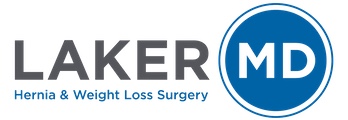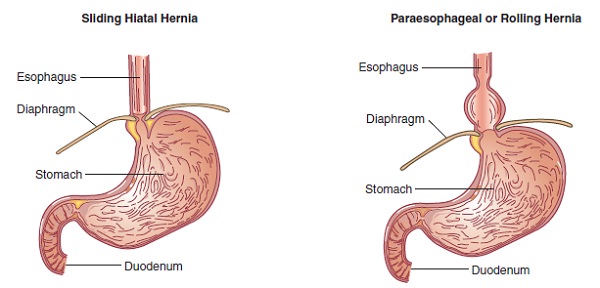What is a Paraesohpageal Hernia?
Paraesophageal hernias are similar to the more common type I or sliding hiatal hernia but tend to be much larger in size. Often, a larger volume of stomach has herniated into the chest through a wider opening in the diaphragm. Large paraesophogeal hernias can have the entire stomach within the chest cavity and even other intra-abdominal organs.
The most common symptoms related to paraesohpageal hernias are:
- reflux
- heart palpitations
- recurrent lung infections
- weight loss secondary to inability to eat appropriate volumes
- retching/vomiting
- chronic anemia as a result of slow bleeding from stomach erosions
Do all paraesophgeal hernias need to be fixed?
The most worrisome complication as a result of having a paraesophageal hernia is volvulus. A volvulus occurs when the stomach rotates around its own blood supply thereby cutting off its own circulation. If the volvulus is not corrected this can lead to stomach necrosis (tissue death) and stomach perforation. Thankfully this is a rare phenomenon.
If a patient is medically capable of undergoing the procedure and symptoms can be attributed to the paraesophogeal hernia then elective repair is offered.
How is a paraesophageal hernia repaired?
The repair is similar to what is performed for GERD. The esophagus, stomach and all other organs are mobilized into the abdomen and the diaphragm is closed. Almost always a wrap or fundoplication is perfomed to reduce the incidence of post operative reflux. Because the defect in the diaphragm is generally larger and the amount of stomach involved is usually greater, the degree of technical difficulty is increased. This can add operative time to the repair and most of these procedures can be completed in 2 to 3 hours.
What is the recovery?
Most patients will be discharged within one to three days after the surgery. After discharge patients recover in a fashion similar to those treated for typical GERD.
What are the dietary changes after surgery?
You will receive explicit instructions both before and after surgery about diet. You will progress from liquids to thickened liquids to soft foods and eventually back to a regular ‘heart healthy” diet. Details of the post operative diet will be provided prior to discharge.

